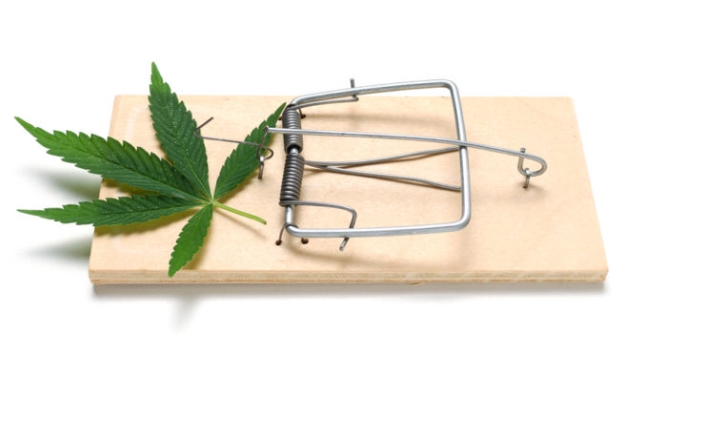According to a Pew Research survey, 61% of Americans think marijuana should be legalized for recreational use. This is nearly double the people who believed weed should be legal in 2000, when only 31% of Americans supported federal marijuana legalization. With a shifting attitude in cannabis use and several states with recreational laws in place, there are now several states that are working to reduce or expunge past cannabis convictions.
More States Erasing Prior Cannabis Convictions
Colorado, Maryland, and Oregon were some of the first states to pass legislation that clear or reduce sentences for prior marijuana convictions. Not everyone who has been imprisoned for past non-violent marijuana crimes has been released, however. While the system is far from perfect, it’s a start.
Orange clock in a jail cellSaveWhen California passed Proposition 64, finally legalizing recreational cannabis in the Golden State, a provision in the law called for the reversal of decades of marijuana conviction, some of which span back decades. San Francisco and San Diego were two of the first California cities to begin the process at the beginning of the year.
While the passing of Prop 64 allowed prisoners of past marijuana crimes to request their records be expunged, Assembly Bill 1793 would require the Department of Justice to “review the records in the state summary history to identify any past cannabis convictions that are potentially eligible for recall or dismissal of sentence, dismissal and sealing, or redesignation.”
In late January 2018, San Francisco prosecutors announced they would dismiss and seal 3,038 misdemeanor charges that dating all the way to 1975, without any action needed by individuals convicted. They also announced they plan to review almost 5,000 felony convictions with the possibility of reducing them to misdemeanors.
Just a week after San Francisco’s announcement, Seattle quickly followed suit. In early February 2018, five years after recreational marijuana laws were passed in Washington, Seattle officials announced they would begin moving in the direction of automatically clearing past misdemeanor marijuana possession charges.
“For thousands of people in Washington state,” said Seattle Mayor Jenny Durkan in a news conference, “a misdemeanor marijuana conviction had huge implications: It could be a barrier to housing, to getting credit, to getting good jobs and education. It is a necessary step to right the wrongs of what was a failed war on drugs.”
This past April, Alaska joined other states in the mission to clear past marijuana convictions with House Bill 316. In an official memo released by the Alaska House Majority Coalition, the bill would “protect Alaskans’ ability to go to work despite past convictions for marijuana possession.”
While the bill still needs to be reviewed by the Alaskan Senate, it’s likely Alaskan voters will follow the decision of voters in other states that have passed similar legislation. Democrat Representative Harried Drummond, who introduced the bill, says, “This bill is not a get out of jail card; it’s a reasonable approach to allow Alaskans to get jobs currently unavailable to them because they did something that Alaskans have voted repeatedly they believe should be entirely legal.”
Life Without Parol for Petty Pot Offences
Person with handcuffs in jail cell, cannabis convictionsSaveThen there are those that didn’t get the opportunity to bond out. The federal marijuana cases where people can get locked up for 20 years or more. In 2016, there were more than 35,000 people across the country arrested on federal marijuana charges. And while solid numbers are hard to find, its believed that since 1996, over 50 people have been sentenced to life without parole for marijuana-related crimes. It’s estimated that almost 70 people are serving life sentences for pot.
Fate Vincent Marshall is one of them. He was convicted of selling two dime bags of weed to an undercover cop in Shreveport, Louisiana. Six months later, he was sentenced to life in prison with no opportunity for parole. The same thing happened to Dale Wayne Green, who acted as the middleman in a $20 weed transaction that was sold to an undercover cop. While these stories might seem hard to believe, there are still places where weed can get you locked up for life.
Weed’s Legal: Past Cannabis Convicts Deserve a Break
While marijuana remains illegal at the federal level, in states where it has been legalized there are several who believe those who have been charged with prior cannabis convictions should be given a break. There is a movement nationwide to clear cannabis charges that no longer seem to be relevant considering current laws. Vermont and New Jersey have also introduced similar bills that would erase prior pot convictions.
While legislation to expunge prior cannabis convictions varies from state to state, the fact that it’s happening at highlights the increased acceptance of marijuana. Although the few that are serving life sentences in states with strict cannabis laws won’t likely be released anytime soon, there is hope on the horizon. For those in legal states with the opportunity to clear their records, doing so has the potential to be life-changing.

